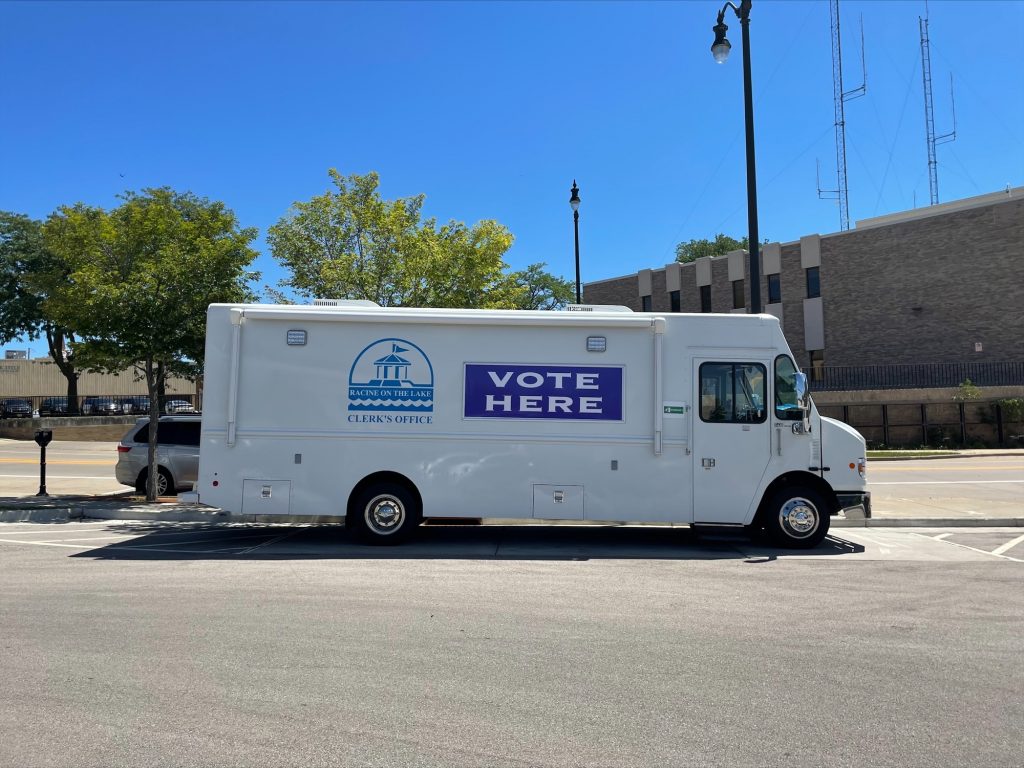Wisconsin Supreme Court Dismisses Racine Voting Van Lawsuit
Court's majority says former Republican official who filed challenge lacked legal standing.

The city of Racine’s voting truck was used in the February 2022, April 2022 and August 2022 elections. Photo courtesy of the city of Racine
The Wisconsin Supreme Court’s liberal majority has dismissed a lawsuit claiming a Racine mobile-voting van is illegal, ruling that the Republican man who filed the challenge didn’t have legal standing to do so.
The battle over the voting van dates back to 2022, when Racine City Clerk Tara McMenamin said it was a way to make voting accessible to as many people as possible during a primary. The van was purchased using money from a grant from the Center for Tech and Civic Life nonprofit, which is funded by Facebook founder Mark Zuckerberg and his wife.
Former Racine County Republican Party Chair Kenneth Brown, who was represented by the conservative Wisconsin Institute for Law and Liberty, filed a complaint with the Wisconsin Elections Commission aimed at prohibiting McMenamin from using the voting van in future elections.
The elections commission dismissed Brown’s complaint, but a Racine County judge ruled in January 2024 that the voting van was illegal. The case was appealed, and the Supreme Court agreed to take it up directly, bypassing a state appeals court.
Writing for the liberal majority, Justice Jill Karofsky said Brown didn’t have legal standing to file his lawsuit because he didn’t show the elections commission’s dismissal of his complaint caused him any injury.
“Brown contends he was injured by WEC’s decision because WEC found no probable cause that the Racine City Clerk violated the law and therefore declined to take corrective action,” Karofsky said. “But Brown does not allege that WEC’s decision personally affected him.”
In her dissent, conservative Justice Rebecca Bradley accused liberal justices of misinterpreting state law on legal standing and leaving Wisconsin “without a decision on fundamental issues of election law enacted to protect their sacred right to vote.”
“The majority agrees and neglects to decide whether the Racine City Clerk designated and operated absentee voting sites in violation of Wisconsin law … and guts the People’s right of access to the courts in election law matters.”
The decision, Bradley argued, elevated the Wisconsin Elections Commission “to a status unrecognizable under the Wisconsin Constitution: An unreviewable Supreme Court of Election Law.”
In a statement, Wisconsin Institute for Law and Liberty attorney Lucas Vebber called it a “sad day” for Wisconsin because it “closes the door to Wisconsinites” seeking to hold government officials accountable for illegal conduct.
“In this case, a circuit court judge determined the election officials in Racine acted unlawfully in their conduct of an election,” Vebber said. “Today’s decision does not address those issues, rather it silences Wisconsinites who seek to challenge such unlawful action.”
The Wisconsin Elections Commission declined to comment on the ruling, deferring to the state Department of Justice, which represented the agency.
In a statement, Attorney Gen. Josh Kaul said in-person absentee voting is a secure way for Wisconsinites to cast their ballots.
“With today’s decision, in-person absentee voting will remain widely available and won’t be unnecessarily restricted,” Kaul said.
Wisconsin Supreme Court dismisses Racine voting van lawsuit was originally published by Wisconsin Public Radio.
If you think stories like this are important, become a member of Urban Milwaukee and help support real, independent journalism. Plus you get some cool added benefits.






















What other communities in Wisconsin and throughout the country are driving voting vans around to the voters? Is this the only place?
What other states use highly restrictive, sometime impossible to get, Voter ID and extended incarceration as methods of voter suppression?